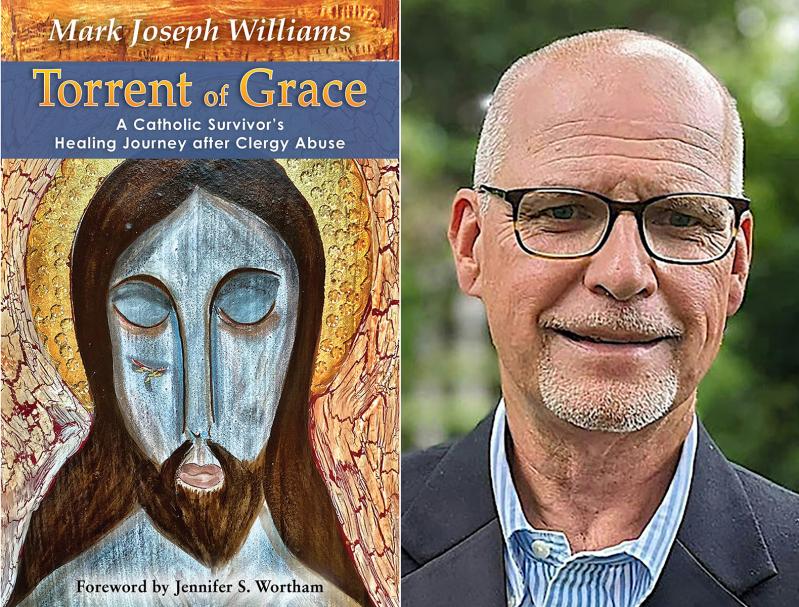“Torrent of Grace"
Mark Joseph Williams
Orbis, $24
Mark Joseph Williams opens his poignant memoir, "Torrent of Grace," with a scene of him as a 12-year-old sitting next to his father's hospital bed, his father encased in a plastic bubble. His 40-year-old father, who had worked with nuclear weapons at the time of the Korean War, had developed acute leukemia. The boy had to wear a rubber glove to touch his dying father.
After his father's death, his mother spiraled out, drinking, attacking him physically and mentally. Men from their community and church reached out to him, an altar boy, and his mother. Some of the men had good intentions. Others decidedly did not. A teacher "groomed" him and raped him at age 13. As a teenager, he began drinking heavily. A priest molested him, and, in a scene that parallels his experience of not being able to touch his father in the hospital, Mr. Williams writes of that priestly "father" fondling him and asking the boy to fondle him in return.
Over the next many years Mr. Williams would hold responsible jobs and marry, yet the torment led him to damaging that marriage and his relationship with his children when he was tossed into lockup for drunken driving. Twice. For 35 years after his rape, he drank daily and heavily. When he stopped abruptly — no detox, no rehab — he experienced enormous physical and emotional upheaval. He quotes William Styron: "Depression is a disorder of mood, so mysteriously painful and elusive in the way it becomes known to the self — to the mediating intellect — as to verge close to being beyond description." He wanted to kill himself.
And then he went to Mass.
Mr. Williams's choice of title, "Torrent of Grace," seems to contain a deep contradiction. However, the deeper meaning of the phrase becomes clear throughout his retelling of horrors then redemption. He began combating his inner storm with the dignity, grace, and love he discovered in his faith. Indeed, he introduces his memoir with an elegant quote from Marilynne Robinson's "Gilead": "Love is holy because it is like grace — the worthiness of its object is never really what matters."
He was able to reach out to members of the clergy for help. And eventually, in his capacity as a forensic psychological clinician with a master's degree in social work, he could use his experiences to help others who had been abused by priests. To further that goal he founded Global Collaborative, which is an organization led by survivors. He continues to campaign to rid the church of pedophiles in the clergy.
Rarely have I seen a book's cover so poignantly capture the spirit of its contents. Perhaps surprising that a reviewer would discuss the cover, but in this case the choice of the art is so emotionally connected to the stories that the author gives us. The work is "Hombre de Sufrimientos (Man of Sorrows)," which is termed a "multimedia retablo by Juanito Jimenez (circa 2005)." The image is of Christ, his face painted blue in long vertical brushstrokes, a cut midway down his right cheek, the eyes replaced by a deeper blue opaque wash. The halo suggests gold intaglio, circumscribed by rough-hewn wood. The suffering is palpable, as are the depth of redemption and the comfort this portrait offers.
Designing book jackets is complex artistically, especially given the revelations throughout these pages, and given the book world's move to digital, the physical art is even more crucial. How easy it would have been for the publishing house to slap a text-only cover on this book. Instead, a brave choice was made that mirrors Mr. Williams's bravery: To tell the full story.
"I am a witness to how those abused as children can heal," he writes. "And I believe this scandal in our Church must be woven into the fabric of today's broken yet beloved Church, woven with threads that spell out the names and that write the truth of those who have been sexually abused, exploited, used, harmed. The Church will remain merely broken unless we listen to the voices of survivors. Unless we take action to condemn those who took our innocence away. 'What is due to the human being as a human being, and that means as a free entity, is first and foremost the acknowledgment of his or her human dignity,' wrote Walter Kasper in his book 'Mercy.' "
In his crusade to work within the church, Mr. Williams had corresponded with Pope Francis about predatory priests. Indeed, Mr. Williams had once been a member of Archbishop Theodore McCarrick's Pennsylvania parish. It was Pope Francis who defrocked McCarrick, acknowledging allegations that had spanned decades. Mr. Williams wrote the pope a letter of gratitude. McCarrick died in April of this year. Just over a month later, on May 8, "the American pope," Leo XIV, was elected by the College of Cardinals. News reports from around the world have raised questions about Pope Leo XIV's agenda, including how he will handle abuse by priests. Mr. Williams's book is certainly timely.
Lou Ann Walker is a professor in Stony Brook University's M.F.A. program in creative writing and the editor in chief of TSR: The Southampton Review. She lives in Sag Harbor.
Mark Joseph Williams, who grew up in East Hampton, will talk about "Torrent of Grace" tonight from 6 to 7:30 at Christ Episcopal Church in Sag Harbor.

